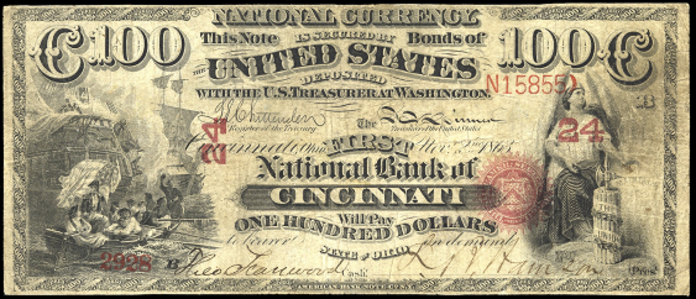One Hundred Dollar Notes › Nationals › 1863 One Hundred Dollar Original Series National Bank Notes › New York Charters › 1863 $100 Kingston New York First National Bank
Get Value Now
| Item | Info |
|---|---|
| Series | 1863 |
| Charter | #451 First National Bank of Kingston, New York |
| Year Chartered | 1864, 503 Banks Chartered |
| City Info | Kingston is a city in and the county seat of Ulster County, New York, United States. It is 91 miles north of New York City and 59 miles south of Albany. It became New York's first capital in 1777, and was burned by the British on October 13, 1777, after the Battles of Saratoga. In the 19th century, the city became an important transport hub after the discovery of natural cement in the region, and had both railroad and canal connections. Passenger rail service has since ceased, and many of the older buildings are part of three historic districts, such as the Stockade District uptown, the Midtown Neighborhood Broadway Corridor, and the Rondout-West Strand Historic District downtown. Source: Wikipedia |
| Similar Cities | If your note doesn't match try: 1. Kingston, New York - State of New York National Bank 2. Kingston, New York - National Ulster County Bank 3. Kingston, New York - Rondout National Bank 4. Kingston, New York - Kingston National Bank 5. Kingston, Rhode Island - National Landholders Bank |
| Seal Varieties | Red with rays |
| See Also | If your note doesn't match try: 1. 1863 $100 Compound Interest Treasury Note 2. 1864 $100 Compound Interest Treasury Note 3. 1863 $100 Gold Certificate 4. 1861 $100 Interest Bearing Note 5. 1863 $100 Interest Bearing Note 6. 1864 $100 Interest Bearing Note |
| Other Info | 1. Value depends on notes known for charter, condition and market demand. |
| Neat Fact | Issued in sheets of 4 Notes: 3 $50 Notes, 1 $100 Note. Also just 1 $50 Note & 1 $100 Note. Less commonly other combinations (Friedbergs, 20h Ed. P107) |
No Obligations Offers and Appraisals
Please submit a good photo or scan. It will be identified and evaluated. Understand there may be subtle differences between the image you see above and your note. Signatures, design, markings and note condition will determine the offer price. Notes in Uncirculated or better condition receive the best offers.
Appraisals can be estimated for wholesale and retail prices. Wholesale is what dealers typically pay. Retail is what a collector might pay. Retail is slightly higher in most cases.
Please visit this page for USA Paper Money Reference. Do not treat this page as a reference guide, it is for appraisal and acquisition purposes only.
